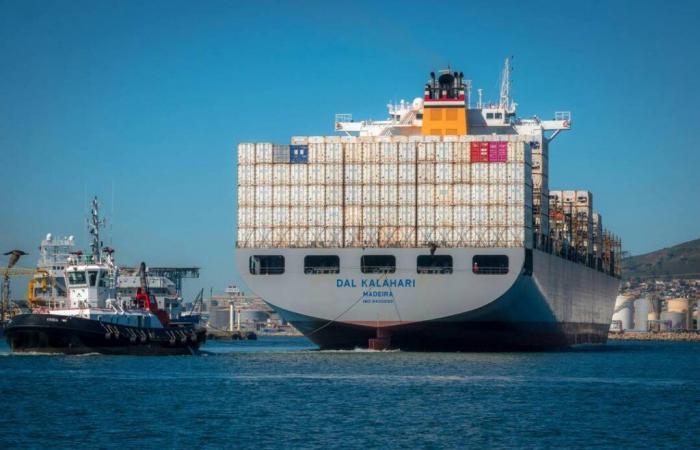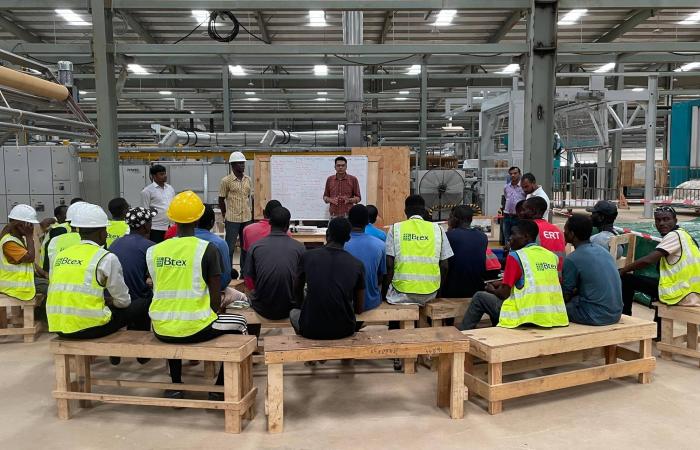Perspective shift: Now imagine that you are an entrepreneur and you have participated in the construction of a bridge. Or that you have sold Swiss industrial machines abroad (for the manufacture of asphalt or clothing). The foreign customer suddenly cannot or does not want to pay for the goods. The uninsured failure to pay must then be borne by the exporter himself. In the worst case scenario, he must file for bankruptcy.
This is where the offer from Swiss Export Risk Insurance SERV comes in: this public law institution of the Confederation supports Swiss companies in their export activities. In the example cited, SERV would cover the default of payment up to 95% of the insured amount and would pay the Swiss exporter. In addition, it would give the buyer the possibility of repaying the amount due in the ordinary procedure. And this, in a way that both parties benefit from it. For what? The answer is simple: because Switzerland is an exporting nation.
“To assess a risk, we talk to people, not machines”
Yvonne Pusch is Chief Financial Officer (CFO) of Swiss Export Risk Insurance SERV. As CFO, she is responsible for the company’s financial matters, including risk models and digital transformation in international trade.
First of all, a fundamental question: what distinguishes SERV from other insurances?
Yvonne Pusch, financial director: SERV is a public law establishment of the Confederation. We have two main legal objectives: to maintain and create jobs in Switzerland and to promote the exports of Swiss companies. SERV has no performance targets nor is it funded by taxpayers’ money. It is not regulated by Finma with regard to risk management and models, unlike private insurance. We insure risks that are not, or not sufficiently, covered by private insurance.
You are not subject to the Federal Financial Market Supervisory Authority (Finma)?
No, we are not. We develop our own framework and have to design our own models without following Finma guidelines. But this also means that we are a little more conservative – in the calculation of risk capital for example, that is to say the capital that we must at least keep in reserve in case things go wrong. However, such a scenario would be highly unlikely.
This doesn’t seem very risky…
On the contrary. Our activity involves many risks. It takes a lot of experience and tact to find the right balance between security and entrepreneurial flexibility.
Who are your customers?
We mainly support Swiss companies that export goods or even services provided that the exporter is domiciled in Switzerland. The volume of insured export operations can vary between 10,000 and several hundred million Swiss francs. In principle, we take on business that others do not want to take on: this often also includes large general contracting projects, called EPC (Engineering, Procurement and Construction).
Do you have an example?
In 2023, SERV supported a major textile project in Benin. We secured Swiss supplies for the construction of a modern textile factory near Cotonou. A company from Zug is coordinating the project, in which several Swiss companies are participating. We thus promote the economic development of Benin while strengthening Swiss exports, with one condition: at least 20% of services come from Swiss value creation. It is a legal obligation. In addition to pure production, research and development also comes into play.
How do you do the calculation?
Our risk models are based on various factors and many years of experience in assessing country, bank and corporate risks. We assess the security of the destination country and classify it according to OECD criteria. We then review the specific project and check the policyholder’s rating. It can be a company, but also a ministry. We pay particular attention to cash flow, investment projects and sustainability. We then calculate the premiums corresponding to the risk in order to be economically independent. We often work with project managers. It also happens that small businesses contact us directly.
What is the advantage of SERV insurance?
To have a bigger reserve! (Laughs.) Many of our cases are very long term – five years, and that’s still short for us. We often take on projects lasting twelve or even twenty years. Private insurers fear these long terms due to regulatory requirements and uncertainty regarding risk capital.
All right. But a question remains: how is it possible to assess a risk based on the uncertain global political situation?
It’s always a balancing act. Tensions between China and the United States, the war between Russia and Ukraine and other global conflicts are factors that have a direct influence on SERV’s activities as well as its customers. We must continually adapt our risk assessments. Our team always examines the environmental and social impact of major projects, for example in relation to human rights or climate protection. Ultimately, the defining aspect of our work is human expertise. To assess risk, we talk to people, not machines. We need both artificial intelligence and human intelligence to properly assess complex risks.
On the other hand, you are needed precisely in places where other insurance companies would say “no way!”
This is precisely the point I wish to illustrate here. If we only took these calculations into account, many of these projects would never see the light of day. This is also the reason why we work on a subsidiary basis. In my previous role as a risk manager for a private insurance company, I would have said, “Thanks, but no thanks.” Or I would have charged such high premiums that it wasn’t worth it for the customer. These are really countries where we don’t necessarily usually go and where the capacity on the private market is not yet as mature. This makes SERV’s mission all the more important.
How do you see the future of the Swiss export economy, for example regarding new markets?
We see great potential, especially in Africa. The African market is growing and offers many opportunities, particularly in the areas of infrastructure and energy. Swiss exporters can score points in this area thanks to their expertise in special products. Calculations but also legal and practical questions come into play. Evaluating projects in such markets requires careful analysis of different factors such as political stability, economic development and legal framework. Our risk models must take all of these aspects into account to ensure adequate insurance.
What is the role of SERV for SMEs in Switzerland?
Our mandate is clearly focused on SMEs and export promotion. In fact, SMEs generally represent around three-quarters of our clientele. Unlike private insurance, whose eligibility criteria are often stricter, SERV does not impose a minimum size on the projects we support. And that’s also what I appreciate most about my job: we treat everyone equally, regardless of the size of the mission. This should also allow small businesses and start-ups to engage in exporting and offer their products or services internationally.







